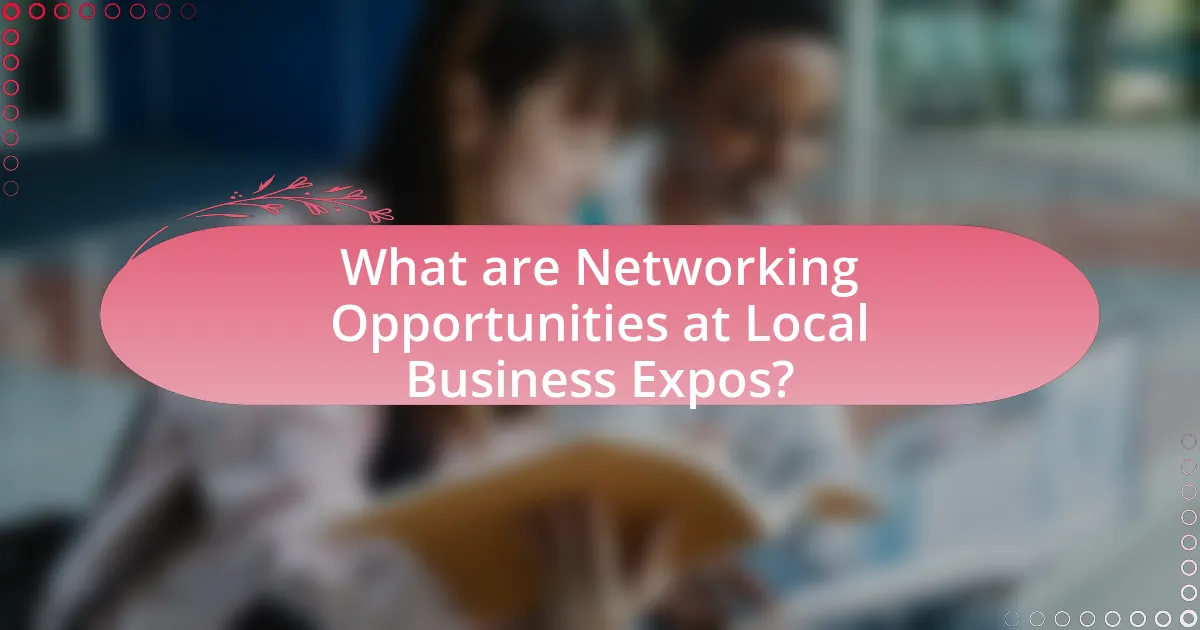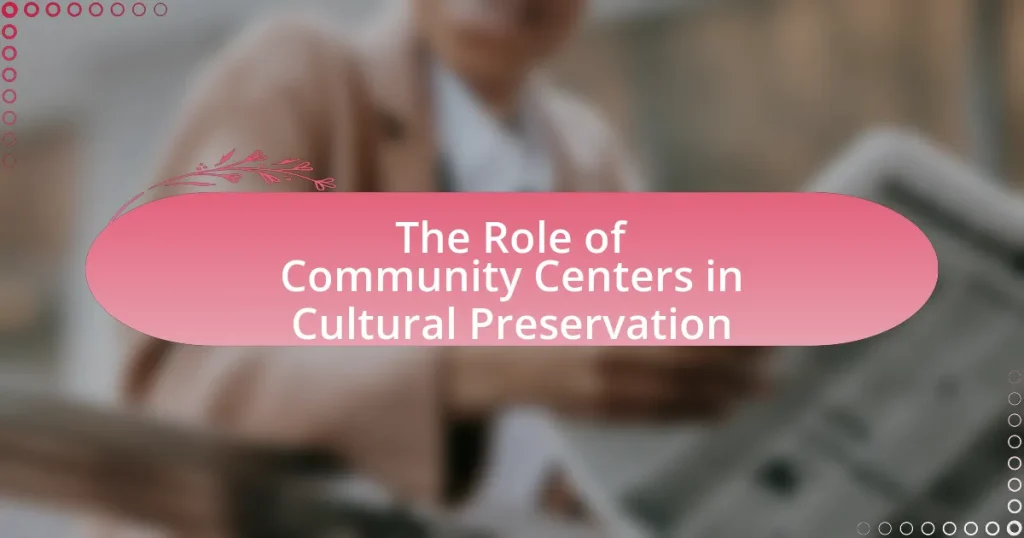Networking opportunities at local business expos are essential for local businesses, providing direct interactions with potential clients, partnerships, and industry peers. These events facilitate face-to-face conversations, workshops, and panel discussions that enhance relationship building and business growth. The article outlines the importance of networking for local businesses, the various formats of networking events, and strategies for effective engagement. It also addresses common challenges faced during networking and offers tips to maximize opportunities, emphasizing the significant impact of networking on business success and community development.

What are Networking Opportunities at Local Business Expos?
Networking opportunities at local business expos include direct interactions with potential clients, partnerships, and industry peers. Attendees can engage in face-to-face conversations, exchange business cards, and participate in workshops or panel discussions that facilitate relationship building. According to a survey by the Center for Exhibition Industry Research, 81% of attendees at trade shows and expos find value in networking, highlighting the importance of these events for business growth and collaboration.
Why are Networking Opportunities Important for Local Businesses?
Networking opportunities are important for local businesses because they facilitate connections that can lead to partnerships, customer acquisition, and increased visibility. Engaging with other local entrepreneurs allows businesses to share resources, knowledge, and referrals, which can enhance their competitive edge. According to a study by the Small Business Administration, 70% of small businesses report that networking has directly contributed to their growth. This statistic underscores the value of building relationships within the community, as these connections often result in collaborative ventures and a stronger local economy.
How do Networking Opportunities Impact Business Growth?
Networking opportunities significantly enhance business growth by facilitating connections that lead to partnerships, client acquisition, and knowledge sharing. These interactions allow businesses to access new markets and resources, which can result in increased revenue and innovation. For instance, a study by the Harvard Business Review found that 70% of jobs are filled through networking, highlighting the importance of relationships in business success. Additionally, networking can provide valuable insights into industry trends and best practices, further driving growth.
What Role Does Networking Play in Building Business Relationships?
Networking plays a crucial role in building business relationships by facilitating connections that can lead to partnerships, collaborations, and opportunities for growth. Through networking, individuals can exchange information, share resources, and establish trust, which are essential components of successful business interactions. Research indicates that 85% of jobs are filled through networking, highlighting its significance in professional advancement and relationship building. Additionally, networking events, such as local business expos, provide a platform for face-to-face interactions, allowing participants to create lasting impressions and foster meaningful connections that can enhance their business prospects.
What Types of Networking Opportunities Can Be Found at Local Business Expos?
Local business expos offer various networking opportunities, including direct interactions with potential clients, partnerships with other businesses, and access to industry experts. Attendees can engage in one-on-one conversations at booths, participate in panel discussions, and attend workshops that facilitate connections. According to a survey by the Center for Exhibition Industry Research, 81% of attendees at trade shows and expos find valuable networking opportunities that can lead to business growth. This statistic underscores the importance of local business expos as platforms for building professional relationships and expanding business networks.
What are the Different Formats of Networking Events?
Different formats of networking events include conferences, workshops, seminars, trade shows, and informal meetups. Conferences typically feature keynote speakers and panel discussions, providing opportunities for attendees to connect with industry leaders. Workshops focus on skill development and often encourage participant interaction, fostering networking among attendees. Seminars are educational sessions that allow for networking during breaks and Q&A segments. Trade shows showcase products and services, facilitating direct connections between businesses and potential clients. Informal meetups, such as happy hours or coffee chats, create relaxed environments for networking without structured agendas. Each format serves distinct purposes and caters to various networking needs.
How Can Attendees Engage with Exhibitors and Speakers?
Attendees can engage with exhibitors and speakers through direct interactions, such as asking questions during presentations, participating in Q&A sessions, and visiting exhibitor booths for one-on-one discussions. These opportunities allow attendees to gain insights, clarify information, and establish connections. Research indicates that face-to-face interactions at expos significantly enhance networking effectiveness, with 85% of attendees reporting that they value personal engagement with exhibitors and speakers for building professional relationships.
What Should Attendees Expect from Networking Opportunities at Local Business Expos?
Attendees at local business expos should expect to engage in meaningful networking opportunities that facilitate connections with potential clients, partners, and industry peers. These events typically feature structured networking sessions, informal meet-and-greets, and dedicated spaces for discussions, allowing participants to exchange ideas and explore collaboration. According to a survey by the Event Marketing Institute, 84% of attendees find networking to be a primary reason for attending expos, highlighting the importance of these interactions in building professional relationships.
What Are Common Activities During Networking Sessions?
Common activities during networking sessions include exchanging business cards, engaging in conversations about professional interests, and participating in group discussions or workshops. These activities facilitate relationship building and knowledge sharing among attendees. For instance, a study by the Harvard Business Review highlights that effective networking can lead to increased job opportunities and collaborations, demonstrating the importance of these interactions in professional growth.
How Can Attendees Prepare for Effective Networking?
Attendees can prepare for effective networking by researching the event and its participants in advance. Understanding the background of other attendees, including their industries and interests, allows individuals to tailor their conversations and establish meaningful connections. According to a study by the Harvard Business Review, effective networking is significantly enhanced when individuals come prepared with specific goals and questions, which can lead to more productive interactions. Additionally, practicing an elevator pitch can help attendees succinctly communicate their value proposition, making it easier to engage with others.
How Can Networking Opportunities at Local Business Expos Benefit Different Stakeholders?
Networking opportunities at local business expos benefit different stakeholders by facilitating connections that can lead to partnerships, sales, and knowledge sharing. For businesses, these expos provide a platform to showcase products and services, potentially increasing customer acquisition and brand visibility. For entrepreneurs and startups, networking can result in mentorship opportunities and access to funding sources. Local governments and economic development organizations benefit by fostering a vibrant business community, which can lead to job creation and economic growth. Research indicates that 85% of jobs are filled through networking, highlighting the importance of these connections for job seekers and employers alike.
What Advantages Do Small Businesses Gain from Networking?
Small businesses gain several advantages from networking, including increased visibility, access to resources, and opportunities for collaboration. Networking allows small businesses to connect with potential customers, partners, and industry experts, enhancing their market presence. According to a study by the Small Business Administration, 70% of small businesses reported that networking helped them grow their customer base. Additionally, networking provides access to valuable resources such as mentorship, funding opportunities, and industry insights, which can be crucial for small business development. Collaborating with other businesses through networking can lead to joint ventures, shared marketing efforts, and innovative solutions, further strengthening their competitive edge.
How Do Startups Leverage Networking for Growth?
Startups leverage networking for growth by establishing connections that facilitate access to resources, mentorship, and potential customers. These connections often occur at local business expos, where startups can meet industry leaders, investors, and peers. For instance, a study by the Kauffman Foundation found that 70% of entrepreneurs attribute their success to networking, highlighting its critical role in gaining insights and opportunities. By engaging in networking activities, startups can enhance their visibility, build partnerships, and ultimately drive their growth trajectory.
What Strategies Can Enhance Networking Experiences at Local Business Expos?
To enhance networking experiences at local business expos, attendees should actively engage in pre-event planning, utilize social media for connections, and participate in workshops or panel discussions. Pre-event planning allows individuals to identify key contacts and set specific networking goals, increasing the likelihood of meaningful interactions. Utilizing social media platforms, such as LinkedIn, enables attendees to connect with other participants before the event, fostering relationships that can be strengthened during the expo. Additionally, participating in workshops or panel discussions provides opportunities to engage with speakers and fellow attendees, facilitating deeper conversations and connections. These strategies are supported by research indicating that proactive networking significantly increases the quality and quantity of professional relationships formed at such events.
How Can Attendees Follow Up After Networking Events?
Attendees can follow up after networking events by sending personalized emails or messages to the contacts they made during the event. This approach fosters relationships and reinforces connections established during the networking opportunity. Research indicates that timely follow-ups, ideally within 24 to 48 hours, significantly increase the likelihood of maintaining professional relationships, as noted in a study by the Harvard Business Review, which found that prompt communication enhances engagement and retention.
What Best Practices Should Be Followed During Networking?
Effective networking during events like local business expos involves several best practices. First, prepare an elevator pitch that succinctly describes who you are and what you do, as this helps establish a clear identity. Additionally, actively listen to others, which fosters meaningful connections and demonstrates genuine interest. Follow up with new contacts promptly after the event, as timely communication reinforces relationships. Utilize social media platforms to connect and engage with contacts, enhancing visibility and interaction. Lastly, maintain a professional demeanor and dress appropriately, as first impressions significantly impact networking success. These practices are supported by research indicating that effective networking can lead to increased opportunities and collaborations in business environments.
What Are the Common Challenges Faced During Networking at Local Business Expos?
Common challenges faced during networking at local business expos include difficulty in making meaningful connections, overwhelming crowds, and lack of follow-up strategies. Many attendees struggle to engage in genuine conversations due to the fast-paced environment, which can lead to superficial interactions rather than lasting relationships. Additionally, the presence of large crowds can create distractions, making it hard for individuals to focus on specific networking goals. A study by the Event Marketing Institute found that 70% of attendees feel overwhelmed by the number of people and activities at expos, which can hinder effective networking. Lastly, without a clear follow-up plan, valuable connections made during the event may be lost, as 80% of business professionals report failing to follow up after networking events.
How Can Attendees Overcome Networking Anxiety?
Attendees can overcome networking anxiety by preparing in advance and practicing conversation starters. Preparation includes researching attendees and creating a list of potential discussion topics, which can help reduce uncertainty and boost confidence. Practicing conversation starters, such as questions about the other person’s business or interests, can facilitate smoother interactions. Studies indicate that familiarity with networking environments and having a clear purpose can significantly alleviate anxiety, as individuals feel more equipped to engage meaningfully.
What Mistakes Should Be Avoided During Networking?
During networking, individuals should avoid being overly self-promotional, as this can alienate potential connections. Instead, focusing on building genuine relationships fosters trust and collaboration. Research indicates that 70% of professionals value authentic interactions over transactional exchanges, highlighting the importance of meaningful engagement. Additionally, neglecting to follow up after initial meetings can lead to missed opportunities; studies show that 80% of networking success comes from consistent follow-up. Lastly, failing to listen actively can hinder effective communication, as active listening is crucial for understanding others’ needs and interests, which is essential for successful networking.
What Tips Can Help Maximize Networking Opportunities at Local Business Expos?
To maximize networking opportunities at local business expos, attendees should prepare by researching exhibitors and creating a targeted list of key contacts. This preparation allows individuals to engage meaningfully with specific representatives, enhancing the likelihood of productive conversations. Additionally, utilizing business cards effectively and following up promptly after the event can solidify connections made during the expo. According to a study by the Event Marketing Institute, 84% of attendees at expos find value in networking, highlighting the importance of strategic engagement.















